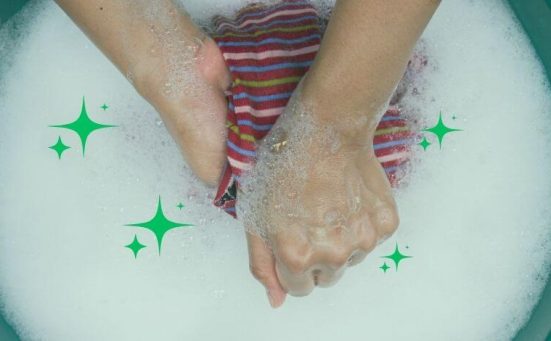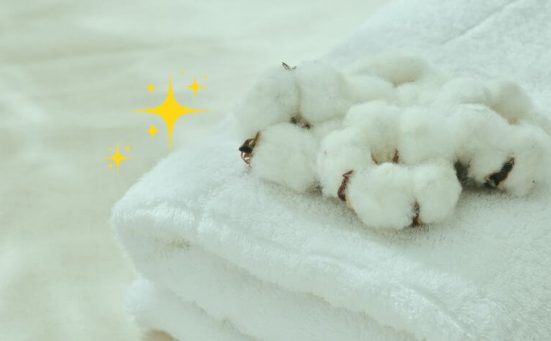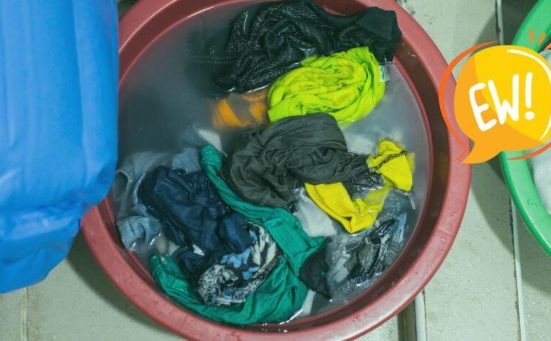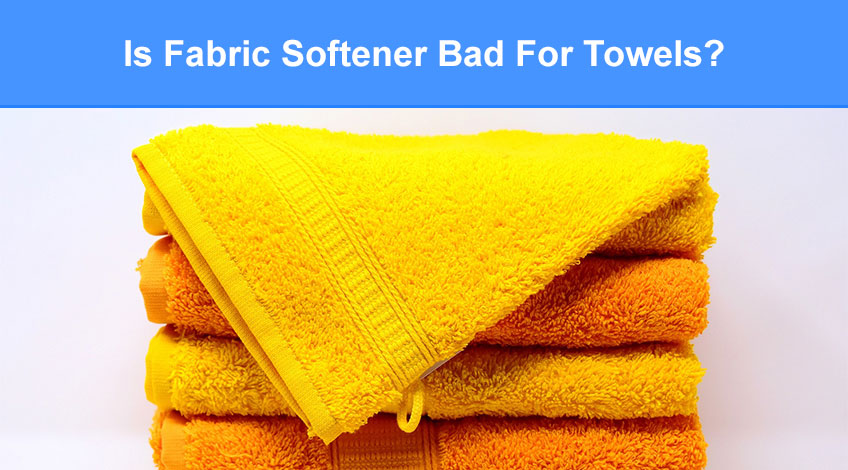
Is Fabric Softener Bad For Towels? (& what’s better!)
There’s something luxurious about a soft, fluffy towel especially after a long hot soak in the bath or a refreshing shower. Sadly that soft fluffiness is often short lived leaving your towels feeling hard, stiff and scratchy. There are several reasons for this and one of them is fabric conditioner.
In this article we look at fabric softener and ask is it bad for your towels? We also look at ways to keep your towels soft and fluffy. The short answer is yes, fabric softener is bad for towels as it can prevent the towel from absorbing water. To find out more, keep reading.
Is Fabric Softener Bad For Towels?
On the face of it adding fabric softener to a wash load of towels seems like a good idea. We want our towels soft and fluffy and the product is called fabric softener. However, to keep your towels soft, fluffy and super absorbent, you need to save the fabric softener for a different wash load.
There are many fabrics, materials and clothes that would benefit from the addition of fabric softener, but towels are not one of them. Fabric softener is commonly used to make clothes feel softer, free from static and smelling fresh.
The problem is that one of the active ingredients in fabric softener is polydimethylsiloxane (PDMS). This substance is a silicone based oil that coats the fibres of the towel or other items. It’s this coating that reduces static and makes clothes feel soft.
However, once the fibres of the towel are coated in this silicone based oil, they become waterproof. This prevents the towel from absorbing moisture which means the towel cannot dry you any more.
Worse still, the towel will not get washed clean once it’s coated in fabric softener. This is because for fabrics to get clean they need to absorb water to loosen the dirt, sweat and stains. This means that constantly using fabric softener on towels not only prevents them becoming clean, it also stops them from drying you too.
A towel that doesn’t dry isn’t very good at all.
What About Dryer Sheets?
Dryer sheets are used in the tumble dryer and are coated with the same or a very similar ingredient to liquid fabric softener. It gets released when exposed to heat like that found in the tumble dryer and works in the same way as the liquid.
So unless you want towels that remain dirty and are not absorbent enough to dry you, we recommend not using fabric softener when washing or drying towels.
Fabric Softeners Can Also Be Bad For Humans Too
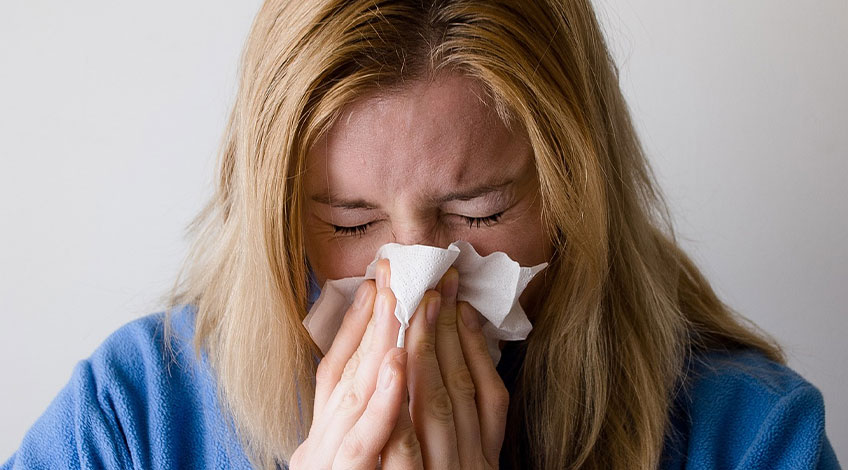
The chemicals used in fabric softeners can also have an adverse affect on us as well. They can cause allergic reactions to those who have sensitive skin and in extreme cases can increase the likelihood of an asthmatic attack.
That’s without the environmental impact that can damage ecosystems and harm aquatic life. In many ways it is a good idea to ditch the fabric softeners and opt for a safe alternative.
Can You Make Towels Fluffy & Absorbent Again?
The good news is, you can often restore your towels to their former glory. As soon as you realise that your towels have become overdosed with fabric softener, you need to apply the remedy.
You might just be surprised when you find out what works best for combatting the effects of too much fabric softener on your towels. A wash cycle with just regular detergent is not enough to remove that fabric softener buildup.
What you need is distilled white vinegar, and hot water. 1 cup of white vinegar to be precise, and water at the highest temperature possible for that particular towel.
White towels can be safely washed at 60 degrees C whilst patterned or coloured towels should be washed at 40 degrees C to prevent the colours from fading or running.
How To Wash Towels To Remove Fabric Softener Buildup Using White Vinegar
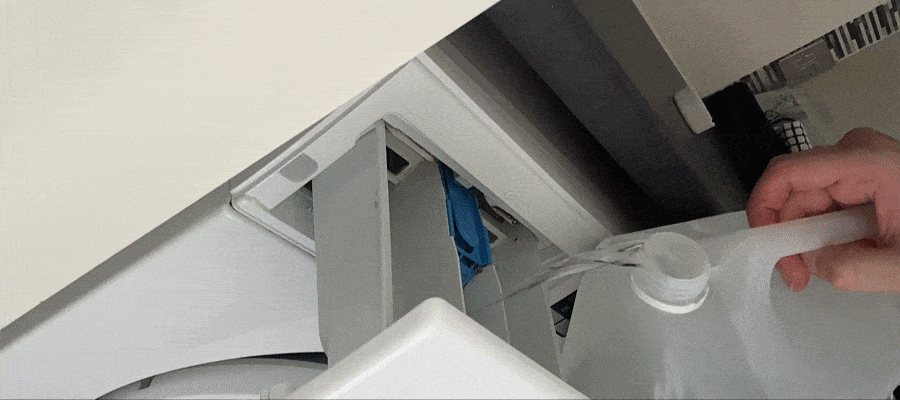
All you need are 2 ingredients; A decent strong detergent and 1 cupful of distilled white vinegar.
Then just do the following;
- Place the towels in the washing machine
Put the towels in the drum of the machine and close the door. - Add detergent
Place the detergent in the correct dispenser in the drawer (usually depicted by the II symbol). - Add 1 cup of white vinegar
Next add 1 cup of white vinegar to the fabric softener compartment (this is usually depicted by a flower symbol).

- Wash the towels
Select the correct wash cycle at the correct temperature (depending on whether you’re washing white or coloured towels). - Dry the towels
Once the machine has finished, remove the towels and either place them in a tumble dryer or air dry.
As you remove the towels from the machine, give them a good shake. This helps to fluff up the fibres. If the towels still feel like they’re hard it is probably caused by still having too much fabric softener residue, you should repeat the wash cycle a second time.
Ways To Keep Towels Feeling Soft & Fluffy
Once you’ve restored your towels to their original softness and fluffiness, you’re going to want to keep them that way. We recommend not using fabric softener on them ever again. Instead you should do the following;
Wash Regularly
It is recommended that towels are washed at least every three days to prevent the buildup of too much bacteria. Hand towels might need washing even more frequently as they’re used more frequently and by more people.
Never Overload The Drum
Adding too many towels to the washing machine drum results in towels that get clumped together. This means they do not absorb as much water as is necessary to get them clean. Which leads to a buildup of detergent which in turn leads to hard, stiff, scratchy towels.
This is equally true for the tumble dryer too. If you cram too many towels in the tumble dryer, you will not get a uniform drying rate. This will leave some patches of moisture alternating with completely dry areas.
Use Less Detergent
The advice given on detergent bottles often over estimates the amount of detergent needed to get your towels clean. By using less detergent you are more likely to remove all of the residue during the washing process.
Less detergent buildup helps keep towels soft and fluffy. It will also benefit your washing machine as a buildup of detergent contributes to the breakdown of components in the appliance.
Wash At The Highest Recommended Temperature
As we said earlier the maximum recommended temperature for washing patterned or coloured towels is 40 degrees C and white towels is 60 degrees C. This should be sufficient to kill bacteria whilst not damaging the fabric.
Use White Vinegar Instead Of Fabric Softener
Now that we know fabric softener is one of the main reasons for towels becoming hard and losing their absorbency, we should use white vinegar instead.
Just ½ a cup in the rinse cycle with towels is enough to keep them soft and fluffy. There will almost never be any vinegar smell left at the end of the cycle. But if you’re concerned about any smell, you could add a tea towel with a few drops of your favourite essential oil to the wash.
Bicarbonate Of Soda Is Another Great Alternative To Fabric Softener
Bicarbonate of soda has many household uses and one of them is as a fabric softener. Pour ½ a cup of bicarbonate of soda into the detergent dispenser before the wash cycle commences.
It will soften towels as it loosens the fibres which releases any dirt or detergent residue. It’s also great for removing that damp, musty smell that towels often get when they’ve been left damp for too long.
It will also slightly whiten white towels which makes it a great choice for washing white towels. Coloured towels will do better with white vinegar to prevent colour fade.
Use Wool Dryer Balls In The Dryer
When it comes to drying towels in a tumble dryer, you should use a low to medium heat (always check the care label) and instead of using a dryer sheet, opt for wool dryer balls. If you don’t have any dryer balls, you can use clean tennis balls instead.
The balls bounce around the drum colliding with the towels as they tumble. This helps soften the fabric, reduces static and also speeds up the drying process.
Give The Towels A Good Brushing
A good way to ensure that towels remain fluffy and soft is to brush the fibres using a hairbrush. You read that right, a hairbrush, it sounds wacky but it works. By brushing each individual strand of fibre, the towel becomes more soft and fluffy.
This is tedious and time consuming but it definitely works. If all else fails, get the hairbrush out and brush your towels.
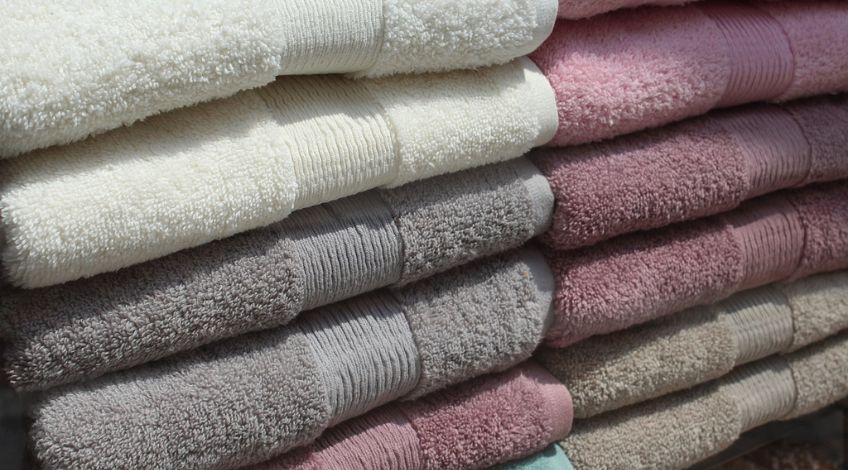
How To Make Towels Smell Good Without Using Fabric Softener
One of the nicest things about fabric softener is the nice fragrance that lingers on your towels for days. Once you give up using fabric softener on your towels, you’ll need to find an alternative.
All you need to do is put around 30 to 40 drops of your favourite essential oil on a tea towel or cloth and add it in the wash or better still the tumble dryer. Fragrances seem to last better after tumble drying so it’s best to use this method in the dryer if you’re going to dry your towels.
Air Drying Towels
Towels often dry better on a clothesline in a breeze. This helps to keep them soft and fresh. However, drying towels in direct sunlight can lead to them becoming over dried. If towels become over dried they can feel hard and scratchy.
Why Do My Towels Smell Musty?
If you store your towels away before they not are fully dry, they will often get a musty smell in the cupboard. You should always ensure your towels are fully dry before storing them away.
Towels should be hung to dry even after tumble drying to ensure they are fully dry.
And if they’re coming out the dryer smelling musty, it might well be that they have bacteria/mould growing on them. In this case, our tip about using white vinegar is going to be your best bet.
SEE ALSO: Washing Machine Drawer Compartments Explained (with drawer symbols)
Frequently Asked Questions
The best alternative to fabric softener to keep towels soft and fluffy is to add ½ a cup of distilled white vinegar to the rinse cycle.
If your towels are hard and scratchy, the best way to make them soft again is to wash them using a strong detergent and add 1 cup of white vinegar to the rinse cycle. You might need to do this twice to fully restore your towel.
Bicarbonate of soda does help to soften towels. This is because it loosens the fibres of the towel which allows any dirt or trapped chemicals to be removed. Just add ½ a cup of bicarbonate of soda to the wash cycle.
Also, follow us on Pinterest ...

